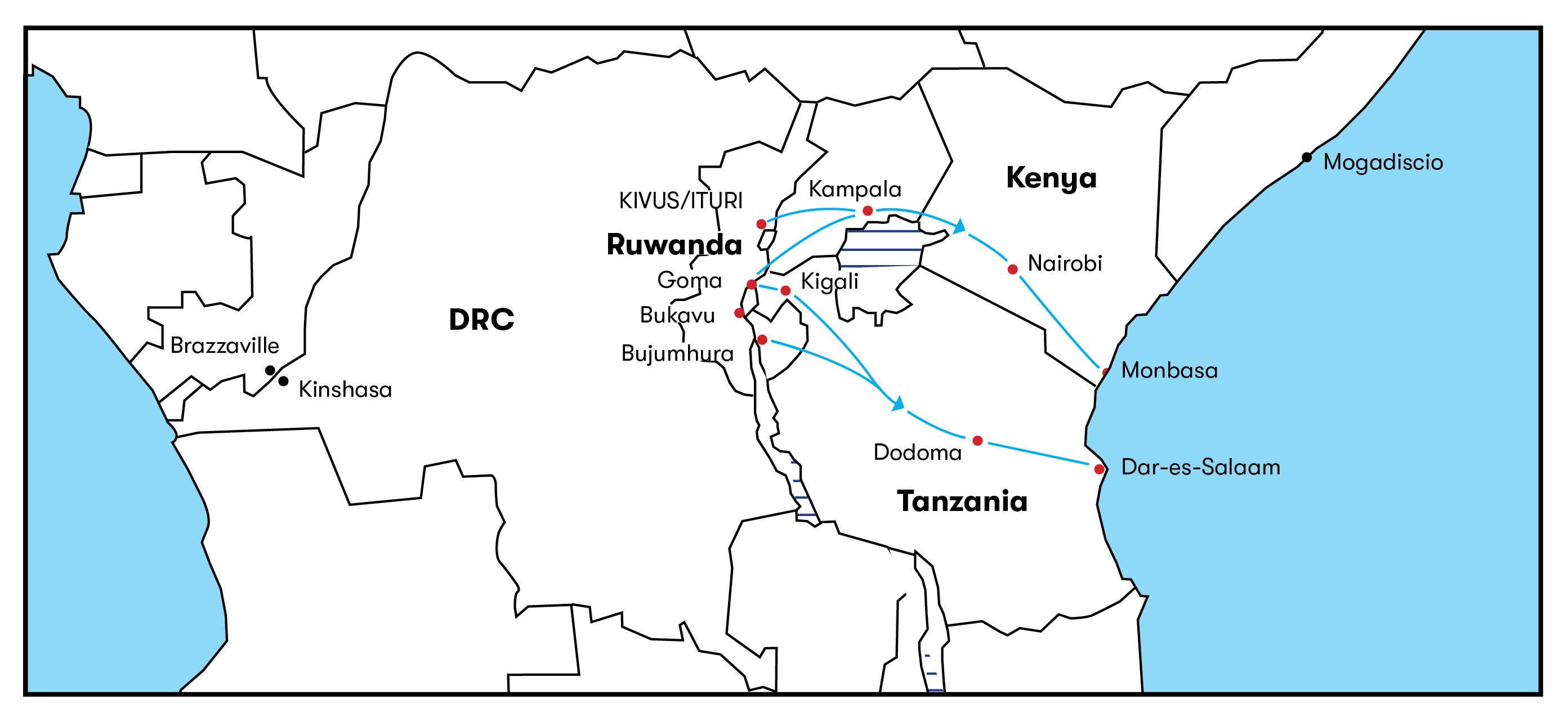An African hunt for natural resources is one reason for the ongoing war in Eastern DRC. The destruction of the Nande people another.
Many reports and books depict the war in the Kivu as greed of the neighboring countries to exploit the minerals. As an example, in an article written by Dr David Himbara, the Rwanda’s Gold Exports fetched US$ 522 Million in 2020, an increase of 754.6%. He further describes how this gold is smuggled from DRC as follows:
‘Rwanda’s gold exports are connected to gold smuggling in DR Congo, while the owners of Aldango Ltd which exports the gold, have been convicted of money-laundering and fraud. Further, the source of gold and its exporter are no longer a mystery. The noted World Bank’s Rwanda Economic Update and the June 2020 UN Group of Experts on DR Congo reveal the source of Rwanda’s gold exports and the owners of the exporter. The exporter is the Kigali-based Aldango Ltd headquartered in Dubai. Meanwhile, the owners of Aldango Ltd were convicted for money laundering and fraud in Belgium in 2020. (...) The World Bank names Rwanda’s gold exporter as “an Emirati gold refinery company in Rwanda in 2019.” And where does Rwanda get such enormous amount of gold to export? The June 2020 UN Group of Experts’ Report connects gold smuggling from DRC to Aldango Ltd in the following terms: Bukavu-based smugglers who deposited gold at Aldango Ltd during 2019 explained that they were paid in cash… Representatives of Aldango Ltd stated, in a meeting with the Group in February 2020, that the company might pay cash to individuals for small gold sales, but that commercial clients had an account.’
But there is another aspect that is concealed in this endless war: the destruction of the economy of the Nande people who seem to have prospered despite the political and economical failure of the Congolese government. Indeed, in the eyes of the ‘balkanisers’, the economic power of the Nande tribe seems to be an obstacle. This tribe living in Beni and Lubero territories, is known for its dynamism in agriculture and trade. The Nande have built their own towns, schools and hospitals without any assistance from the government. During Mobutu’s reign, they were not interested in politics and concentrated their efforts in economic development, therefore their towns – Butembo and Beni – prospered while other administrative entities collapsed because they relied on government intervention. The Nande have spread their economic activities in other provinces where they contribute to the booming of towns like Bunia, Isiro and Kisangani where they are still leaders in informal trade of manufactured products imported from Asia. Before the two Congolese wars, they had developed big farms together with their commercial enterprises and one could feel that life was easier in Butembo-Beni than in other provinces. There was even a saying in Lingala language that ‘Munande azali mundele’ (meaning, ironically: Nande people are like white men).
This situation is seen to be an obstacle to the Rwandan occupation plan. In order to succeed in the balkanisation plan the Rwandans have set up strategies among which one is creating terrorism in the rural areas so that no food can be produced and brought to towns, in particular in Beni and Butembo, and another is blocking all the roads leading to these towns. To attain these goals Rwandans created and supported armed groups and collaborate with the Ugandan rebels who are hiding in the Congolese forest. This is why people are being killed every day in rural areas, houses are burned and lorries, cars and motorbikes are burned on the roads. These days, all the roads to and out Beni-Butembo are blocked by armed groups supported by Rwanda. The Government has installed a system of escorting the vehicles but despite the system, vehicles continue to be burned. So, the economy of the people living in Beni and Butembo is collapsing now and people are starving, which is the aim of the enemies. The Nande people are always crying for help but no one seems to pay attention to their cry.
Maliyasasa Syalembereka Joas studied English at Bukavu Institut Supérieur Pédagogique. From 2002 until 2009 he was in charge of the Leaders Training Programme at the Syndicat de Défense des Intérêts Paysans. In collaboration with Agriterra, he facilitated farmers’ workshops in Rwanda, Kenya, Burundi, Tanzania, Burkina Faso and Niger amongst others. From February 2016 to December 2018, Maliyasasa worked as an advisor to TRIAS in charge of Institutional Strengthening and Organisational Development. Currently, Maliyasasa works as a freelance consultant. He is fluent in French, English, Swahili, Lingala, Kinande and other languages.


